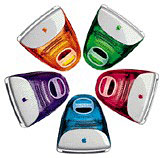 The Mac Web has been on fire since last week when the news
broke that OS X 10.8 Mountain
Lion is apparently going to leave behind another large number of
Macs, some discontinued as recently as 2009. A lot of people are upset
about this. I can't say I blame them, but I also can't say that this
isn't something that we haven't seen many times before.
The Mac Web has been on fire since last week when the news
broke that OS X 10.8 Mountain
Lion is apparently going to leave behind another large number of
Macs, some discontinued as recently as 2009. A lot of people are upset
about this. I can't say I blame them, but I also can't say that this
isn't something that we haven't seen many times before.
In this article, I am going to point out the versions of the Mac OS
that left machines behind after a short period of time (36 months or
less). When you get done reading, I think you'll be happy that Apple is
supporting Macs for a long as it is.
Mountain Lion Isn't the First
When Mac OS 8 launched in July 1997, it dropped support for all
machines with a 68030 processor. This included the PowerBook 150, which was discontinued in
October 1995, just 21 months before the launch of Mac OS 8.
When Mac OS 8.5 launched on October 17, 1998. It dropped support for
all machines with a 68040 processor. This included the PowerBook 190 series, which was
discontinued in September 1996, just 25 months before OS 8.5
launched.
When the first version of Mac OS X Server launched in March 1999, it
dropped support for all pre-G3 based Macs. This included the Power Mac 9600 series, which has
been discontinued in March 1998. That was just 1 year before the launch
of OS X Server.
 When
the first consumer version of Mac OS X launched in March 2001, it also
left behind the pre-G3 Macs. Although OS X 10.0 supported almost
all G3 Macs, it didn't support graphics acceleration on machines
without a Rage 128 (or better) graphics chip. This includes all
Rev. A - D iMacs, Beige G3 Power Macs, WallStreet and Lombard G3 PowerBooks, and the
original Clamshell
iBook. Some of these machines weren't discontinued until September
2000, which means some of them were only 6 months old when OS X
first shipped.
When
the first consumer version of Mac OS X launched in March 2001, it also
left behind the pre-G3 Macs. Although OS X 10.0 supported almost
all G3 Macs, it didn't support graphics acceleration on machines
without a Rage 128 (or better) graphics chip. This includes all
Rev. A - D iMacs, Beige G3 Power Macs, WallStreet and Lombard G3 PowerBooks, and the
original Clamshell
iBook. Some of these machines weren't discontinued until September
2000, which means some of them were only 6 months old when OS X
first shipped.
When Mac OS X 10.6 Snow
Leopard launched in August 2009, it dropped support for all PowerPC
based Macs. Apple started phasing out PowerPC-based Macs in January
2006, and the dual-core
Power Mac G5 was available until August 2006, just 3 years before
Snow Leopard launched.
OS X 10.8 Mountain Lion will launch this summer. Apple hasn't posted
hardware requirements, but based on reports from those using the
Developer Preview, it will apparently drop support for 2006 and 2007 Mac Pros (sold until
early 2008), 2006 through 2007 MacBook Pros (sold until early 2008),
2006 through 2008 MacBooks (sold until early 2009), the original 2008 MacBook Air (sold
until late 2008), 2006 and 2007 Mac minis (sold until early 2009),
Late 2006 iMacs
(sold until mid 2007), and all Xserves
(sold until early 2009).
The whole point of Mountain Lion is to bring more features from iOS
to the Mac.
It sucks that an iPhone 3GS that with a Geekbench score of 289
supports Notification Center, Twitter integration, iMessage, Game
Center, Reminders, Notes, and Documents in the Cloud, but a Mac Pro
that gets a Geekbench score of 11,580 can't run Mountain Lion. But even
though it sucks, Mountain Lion is not nearly the worst offender when it
comes to dropping support for older hardware.
What Needs to Be Done
I think that if we really want old hardware to keep working for us,
we need to stop expecting Apple to keep supporting it and start
expecting the developer community outside of Apple to.
Kudos to Cameron Kaiser for developing TenFourFox (Firefox
10 ported to G3, G4, and G5 Macs) and Classilla (Mozilla ported to Mac
OS 9). We need more developers like him to keep supporting our
hardware. It is people like him - not Apple - that will keep our
machines going long after Apple drops them.

Chris Carson is a longtime Mac user and a more recent convert to iPhone and iPad.

 The Mac Web has been on fire since last week when the news
broke that
The Mac Web has been on fire since last week when the news
broke that  When
the first consumer version of Mac OS X launched in March 2001, it also
left behind the pre-G3 Macs. Although OS X 10.0 supported almost
all G3 Macs, it didn't support graphics acceleration on machines
without a Rage 128 (or better) graphics chip. This includes all
When
the first consumer version of Mac OS X launched in March 2001, it also
left behind the pre-G3 Macs. Although OS X 10.0 supported almost
all G3 Macs, it didn't support graphics acceleration on machines
without a Rage 128 (or better) graphics chip. This includes all

